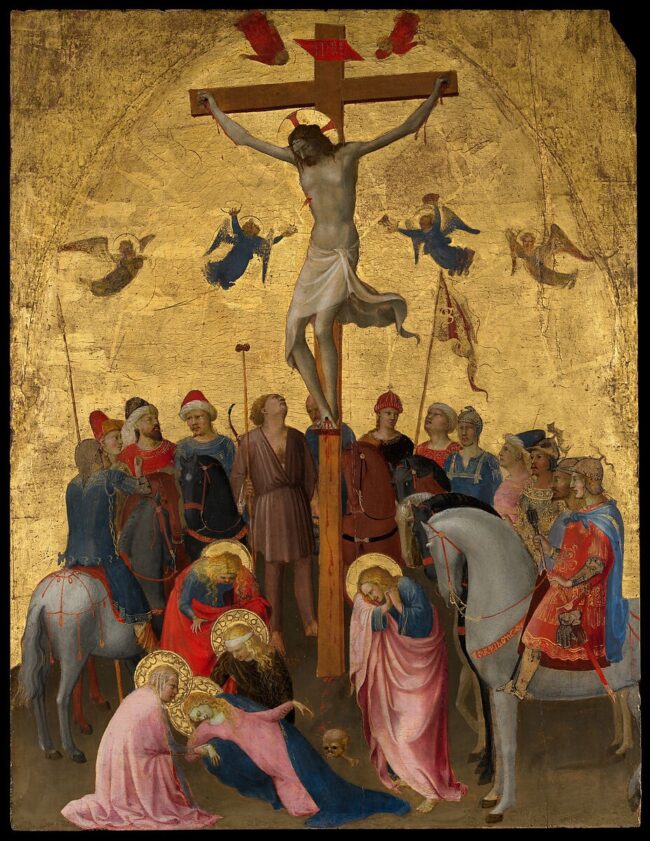In his 1982 Good Friday address, Raniero Cantalamessa urged us all to embrace the confession, “I killed Jesus of Nazareth.”
Think about that for awhile, because I’ve been thinking of it a lot for the past few months, and it’s truly transformative.
We tend to put that phrase in collective terms, “we all killed Jesus of Nazareth,” and while that’s true, we can only experience the gravity of it when we say, “I was Judas who betrayed you that night. I was the soldier arresting you. I was Peter denying you. I was the self-righteous council condemning you. I was Pilate sentencing you. I spit on you and watched and laughed as you died for me.”
There’s something different about it when we say, “I” instead of “we” because “we” removes us a bit from the process. “Sure, I shouldn’t have done, but they were doing it, too. We all were doing it.”
Collectivizing it is the first step on the way to thinking that somehow we’re not quite as bad as all that – that somehow this isn’t about us. It’s about the world. It removes our sting a bit from Christ’s sting.
But the more I think about it, the more vital I believe it is to continually remind myself of this — “I killed Jesus of Nazareth,” and it’s not because I should wallow in my sin.
It’s because I need, and all Christians need, humility, humility, and more humility.
When I can honestly tell myself, “I killed Jesus of Nazareth,” it becomes impossible for me to adopt a self-righteous tone towards any other human being — no matter who they are, or what they believe, or what they’ve done.
When I can honestly tell myself, “I killed Jesus of Nazareth,” I can’t, in any way, belittle, demean, or write off someone else without killing Jesus myself again.
Our society is obviously fractured, and it is because the tribes have judged themselves less complicit in Christ’s death.
That is, ultimately, how hate begins.
It begins with pride and what could be a grander object of pride than to say, “I didn’t kill Jesus as much as you did”?
We don’t even think on those terms, consciously, but I think that subconsciously, there is a dialogue within us, within the whole world that says, “I’m less to blame for something than someone else. I’m less at fault.”
Less at fault for what?
We can think of examples, and we do, but unfortunately we think of the wrong ones, because somehow we tend to arrive at a place of moral superiority and self-righteousness.
Moral superiority might be possible in a world where there was a “less at fault” option.
But we don’t live in a “less at fault” world.
Because we were equally at fault for the greatest sin of all, and therefore, any claim to moral superiority is hypocrisy.
That’s why clarifying to ourselves “I killed Jesus of Nazareth” is crucial to our witness. I am not less at fault for anything. I am equally at fault for the worst act ever committed.
That’s a big deal.
“I killed Jesus of Nazareth” isn’t meant to invoke the kind of shame that produces self-loathing.
It’s meant to invoke the kind of humility that produces loving others.
Right now, I think American Christianity is in crisis because we have forgotten, I have forgotten that I killed Jesus of Nazareth.
If we, as a Christian church, taught ourselves this every day, we would reconsider how we engage with every human being.
As a church, our witness will wither if we fail to remember how withered we are.
As a church, we will produce hate if we fail to remember how hateful we were by killing Jesus.
When we complain about how we’re treated, when we complain about persecution, do we remember what we did thousands of years ago to Christ?
And what did Jesus say to us when we persecuted him, what did he say to us when we killed him, how did he respond: “I love you anyway.”
If he could look down at us and forgive us, how can we look down on another?
Thank you, dear God, that even though I killed you this day, you forgave me in a moment, and you forgive me every day, and will never fail or forsake this Judas who put you up there.
God won’t leave you, either.
No matter what you did to him, no matter how you sinned against him now, today, and tomorrow, no matter what should happen, his forgiveness was good for that Friday and for every day that’s lived.
He is continually reaching towards us. That’s why he came. For us. That’s why he died. For us. That’s why he rose. For us.
He’s for us. Now we tell others this wonderful news, while reminding ourselves that we must do so with the humility, care, and love that can only come from understanding that we, too, put Jesus to death.
And as the line goes from Mozart’s Requiem, “Remember, me merciful Jesus, for I am the cause of thy journey.”

